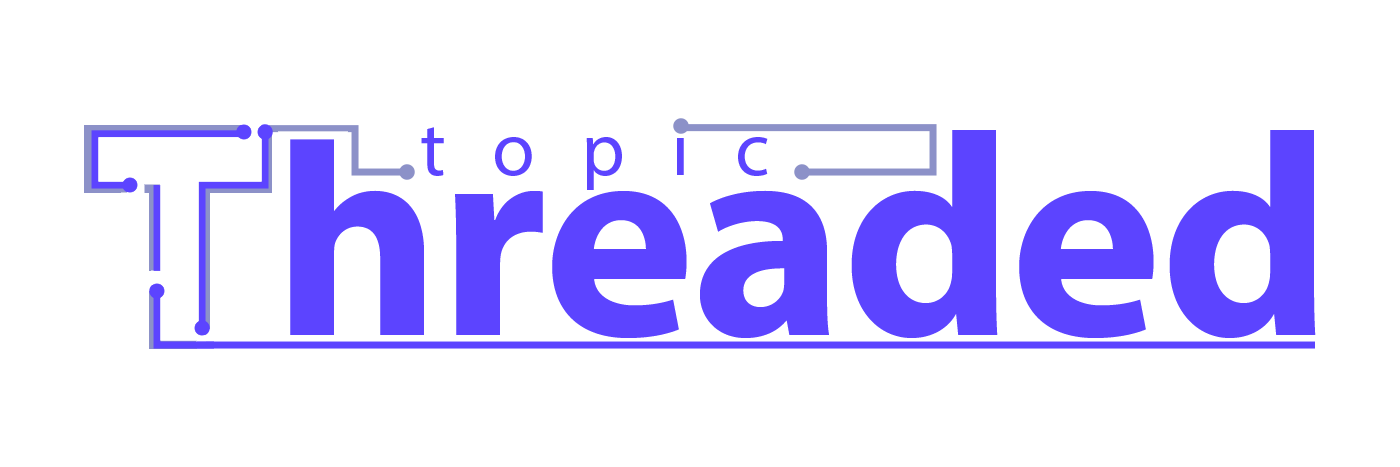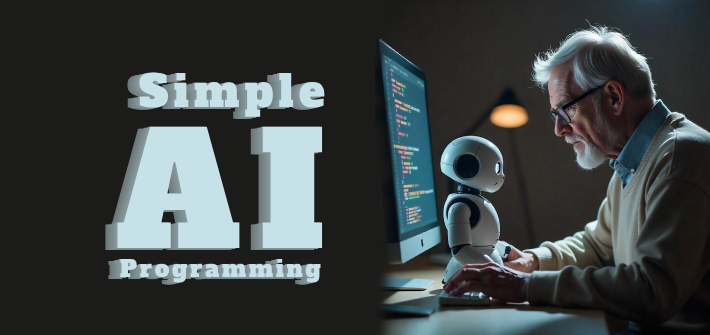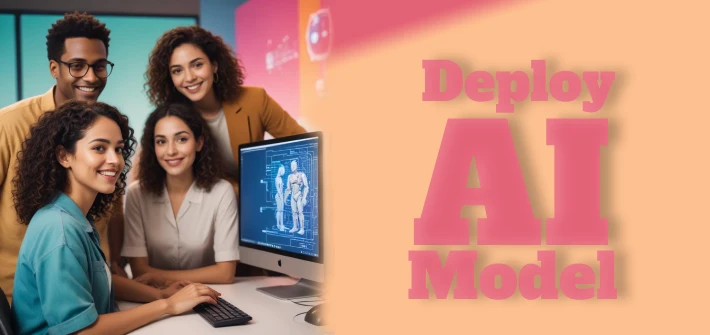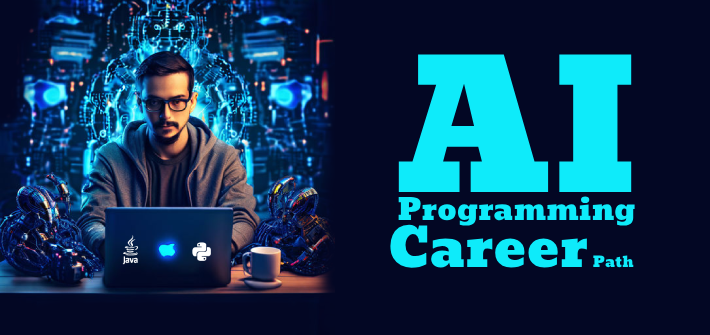Common Learning Across All Programming Domains — How to Become a Programmer
There are certain fundamentals that apply to all programming areas. These include understanding variables, control structures (like loops and conditionals), data structures (such as arrays, lists, and dictionaries), algorithms, and basic programming concepts.
Regardless of the language or platform, mastering these basics is essential if you want to know how to become a programmer. They provide the foundation you need to become a good programmer and can help you whether you’re aiming to learn how to become a Java developer, how to become a software programmer, or wondering how do I become a computer programmer.
Making the right choices in these areas will boost your motivation during the learning process. Remember that every time you engage in a specific field, you are, in fact, learning. Moreover, developing programming skills in your chosen domain should be your primary focus.
This article guides you on how to choose a suitable domain and programming language.
Table of Contents
Choosing Your Programming Domain — A Key Step in How to Become a Programmer
Programming covers many fields — web development, mobile apps, data science, game development, embedded systems, and more.
Selecting a specific domain helps you focus your learning path. For example, if you want to build websites, you’ll need to learn HTML, CSS, JavaScript, and a backend language like PHP or Python.
Each domain comes with its own set of tools, languages, and workflows. Picking one that fits your interests and goals is a smart move for anyone exploring how to become a software programmer or even how to become a Java developer. This decision is essential for those wondering how do I become a programmer or aiming to become a good programmer in a specialized field.
Next, examine the job market. If the chosen programming domain is growing and trending in the market, with many people utilizing it, consider prioritizing this domain. For instance, the field of artificial intelligence is advancing, and the job market benefits from combining it with areas such as mobile and web application development. You can execute a comprehensive project using both of these domains simultaneously. Choosing one of these domains and continuing to learn in it can be beneficial for you.
Some programming domains that may receive more attention in the future include mobile programming, desktop programming, web programming, artificial intelligence programming, and computer game programming. Therefore, selecting one of these domains and progressing in learning and skill development within it can be the foundation of your success in the programming world.
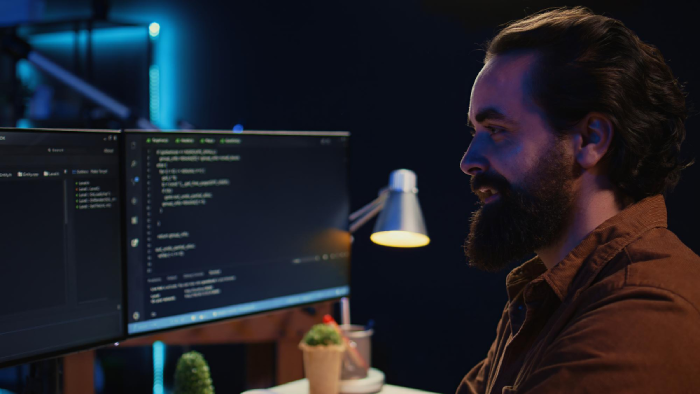
Why Become a Programmer?
The field of technology is continuously evolving, presenting us with new technological models every day. If we can synchronize with technological advancements, there’s an opportunity to stay ahead of others. Concepts such as virtual pages, artificial intelligence, and applications have been introduced, changing our lives. With creative ideas and programming skills, we can contribute valuable shares to the technology market.
As a programmer, there is potential to work for both large and small companies or operate as a freelancer and earn income. To achieve these goals, it’s important to focus on your objectives and the specific decisions you want to make. Do you want to launch an application? Do you want to take on projects and work freelance? Or perhaps, are you looking for employment in a large company?
Regardless, to improve and achieve these tasks, gaining more experience is necessary.
The First Step in Learning Programming:
Before diving into any specific programming language, the most important initial step in learning how to become a programmer is to understand the concept of algorithms. This foundational skill is crucial whether you’re wondering how do I become a programmer, how do you become a coder, or even how to become a software programmer.
Algorithmic thinking involves breaking down a problem into logical steps. Instead of rushing into code, beginners should first learn to think like a programmer. Creating flowcharts can also be helpful; they visually represent the flow of your program and help in planning before any actual coding begins.
If you’re aiming for paths like how to become a Java developer or how to become a good programmer, mastering algorithms will serve as the core of your learning process. It enhances your logical reasoning and prepares your mind for writing structured and efficient code.
✅ Pro Tip: Don’t skip this step. No matter what domain you choose—web, mobile, or software
Choosing the Easiest Programming Language for Beginners:
When you’re just starting your journey and wondering how to become a programmer, selecting the right programming language can make a huge difference. Beginners often feel overwhelmed by the variety of options—Python, Java, JavaScript, C++, and many more. But the key is to start simple.
One of the most recommended languages for beginners is Python. It’s easy to read, has a simple syntax, and is widely used in many fields including web development, data science, and automation. If you’re curious how to become a software programmer or how do I become a computer programmer, Python is a great way to begin.
For those looking specifically at how to become a Java developer, Java is also beginner-friendly and is a strong foundation for building Android apps or enterprise-level software.
🟢 Start with Python if you want flexibility.
🔵 Choose Java if you aim for app development or enterprise software.
No matter which language you pick, the most important thing is to start coding. That’s the real beginning of mastering how to become a programmer.
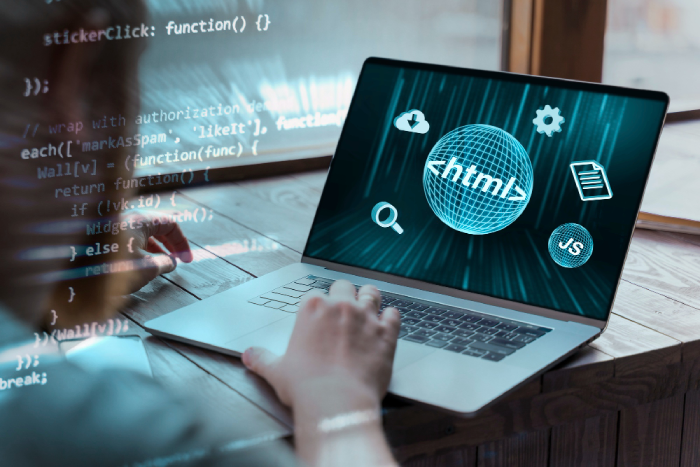
Common Learning Across All Programming Domains for Becoming a programmer
Common learning across all programming domains requires an understanding of fundamental concepts and broad skills. In this path, factors that can strengthen the foundation of your learning include:
Database:
Using databases like SQL Server, MySQL, and Oracle for storing and retrieving information.
Clean Coding:
The ability to write readable and organized code in any programming language.
Object-Oriented Programming:
Using object-oriented programming for better code structuring and increased reusability.
Data Structures:
Choosing and using suitable data structures to improve program performance.
Unit Testing and Execution:
Writing unit tests to ensure the correctness and proper functioning of the code.
Version Control:
Using version control tools like Git to track changes in code.
Test-Driven Development:
Implementing test-driven development to enhance code compatibility.
API Interaction:
Familiarity with interacting with APIs for data exchange between systems.
Code Security:
Awareness of security principles and vulnerability management in code.
Documentation:
Writing comprehensive documentation for code to facilitate understanding by other developers.
Code Profiling:
Using profiling tools to optimize code performance.
Software Architecture Concepts:
Understanding software architecture principles and choosing suitable architecture for projects.
These concepts help you progress comprehensively and consistently across all programming domains.
Practice Every Day: The Key to Becoming a Good Programmer
Learning theory is important, but without daily practice, it’s difficult to truly master programming. If you’re serious about how to become a programmer, you must write code consistently—even a little bit every day.
Practicing helps you understand logic, solve problems faster, and avoid common mistakes. It also strengthens your understanding of algorithms, syntax, and frameworks. If you’ve been asking, how do I become a programmer or how to become a good programmer, the answer is simple: practice regularly.
Start with small projects like a to-do list app, a basic calculator, or even a simple blog. These projects will help you build confidence. For those aiming to learn how to become a software programmer or how do you become a coder, nothing beats hands-on experience.
🧠 Coding is like a muscle — the more you use it, the stronger it gets.
So if you truly want to master how to become a programmer, commit to writing code every single day.
Best Learning Resources for Programming (for Becoming a programmer)
What to study to become a programmer
Learning programming is an engaging and challenging journey, and today, there are numerous resources available for this purpose. Here are some top resources for learning programming in all domains:
General Programming Learning for Becoming a programmer
Codecademy: Codecademy is a website with excellent interactive tutorials for various programming languages such as Python, JavaScript, Ruby, and many more.
Coursera: Specialized courses from reputable universities and institutions can be found on Coursera.
edX: Similar to Coursera, edX also offers educational courses from prominent universities worldwide.
Learning Specific Languages:
Python:
Official Python Tutorial: Python.org provides fundamental Python tutorials.
Django for Web Development: For web development with Python, the official Django documentation is useful.
JavaScript:
MDN Web Docs: MDN Web Docs is a comprehensive and up-to-date resource for learning JavaScript.
Node.js Documentation: For learning Node.js, refer to the official Node.js documentation.
Java:
Oracle Java Tutorials: Oracle’s official tutorials for learning Java are highly practical.
Spring Framework Documentation: For development with the Spring framework, check the official Spring documentation.
Learning Technologies and Specific Tools:
React.js:
React Official Documentation: The React Official Documentation is an excellent resource for learning React.js.
Docker:
Docker Documentation: Docker Documentation provides comprehensive information about containers and Docker.
Learning Deep Concepts:
Fast.ai: Fast.ai courses are highly recommended for learning deep learning.
Coursera Deep Learning Specialization: Specialized deep learning courses from Coursera’s Deep Learning Specialization are also reputable.
Practical Projects:
GitHub: Visit GitHub and participate in open projects. It’s an excellent opportunity to learn from others’ experiences.
LeetCode: For strengthening algorithmic skills and data structure knowledge, LeetCode is a valuable resource.
The most crucial aspect of learning programming is consistency and practical exercises. Engaging in practical projects and solving deeper problems can significantly enhance your learning experience.
Conclusion: How to Become a Programmer the Right Way
How to become a programmer is a question many aspiring developers ask—and the answer lies in commitment, clarity, and continuous learning. Choosing the right programming domain and language based on your interests, skills, and market demand is a vital step toward success. Whether you’re passionate about AI, game development, mobile apps, or web technologies, aligning your path with your passion will keep you motivated.
The journey of how to become a programmer also involves mastering the basics—algorithms, problem-solving, and understanding core concepts such as databases, clean code, object-oriented programming, and data structures. These foundational skills apply across all domains.
Remember, how to become a programmer is not just about writing code—it’s about building the mindset to solve problems, think logically, and never stop learning.
